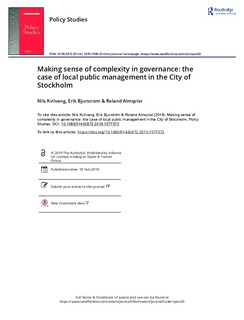Making sense of complexity in governance: the case of local public management in the City of Stockholm
Journal article, Peer reviewed
Published version
Permanent lenke
http://hdl.handle.net/11250/2642767Utgivelsesdato
2019Metadata
Vis full innførselSamlinger
Sammendrag
This study found that the problem-solving capacity of a public organization can be understood in terms of the legitimacy of the formulated problems and solutions. Increasing the problemsolving capacity depends on not only the acceptance of problems and how to solve them but also on formal structures and processes. Sensemaking and framing are important keys to unlocking how legitimacy is built, and consequently, how problem-solving capacity is built in a complex organization. We contend that although governance theory recognizes complexity through concepts such as networks and multi-levelness, empirical research tends to downplay what complexity can entail, thus limiting the theoretical development and practical usability of governance theory. Using complexity as a sensemaking framework, we analyze how the top-tier managers of a capital understand the challenges and solutions of coping with rapid growth. We argue that although complexity theory is no panacea to unlocking the difficulties of public sector challenges, it can be a valuable guide to future research on governance.
Beskrivelse
This is an Open Access article distributed under the terms of the Creative Commons Attribution-NonCommercial-NoDerivatives License (http://creativecommons.org/licenses/by-nc-nd/4.0/), which permits non-commercial re-use, distribution, and reproduction in any medium, provided the original work is properly cited, and is not altered, transformed, or built upon in any way.

